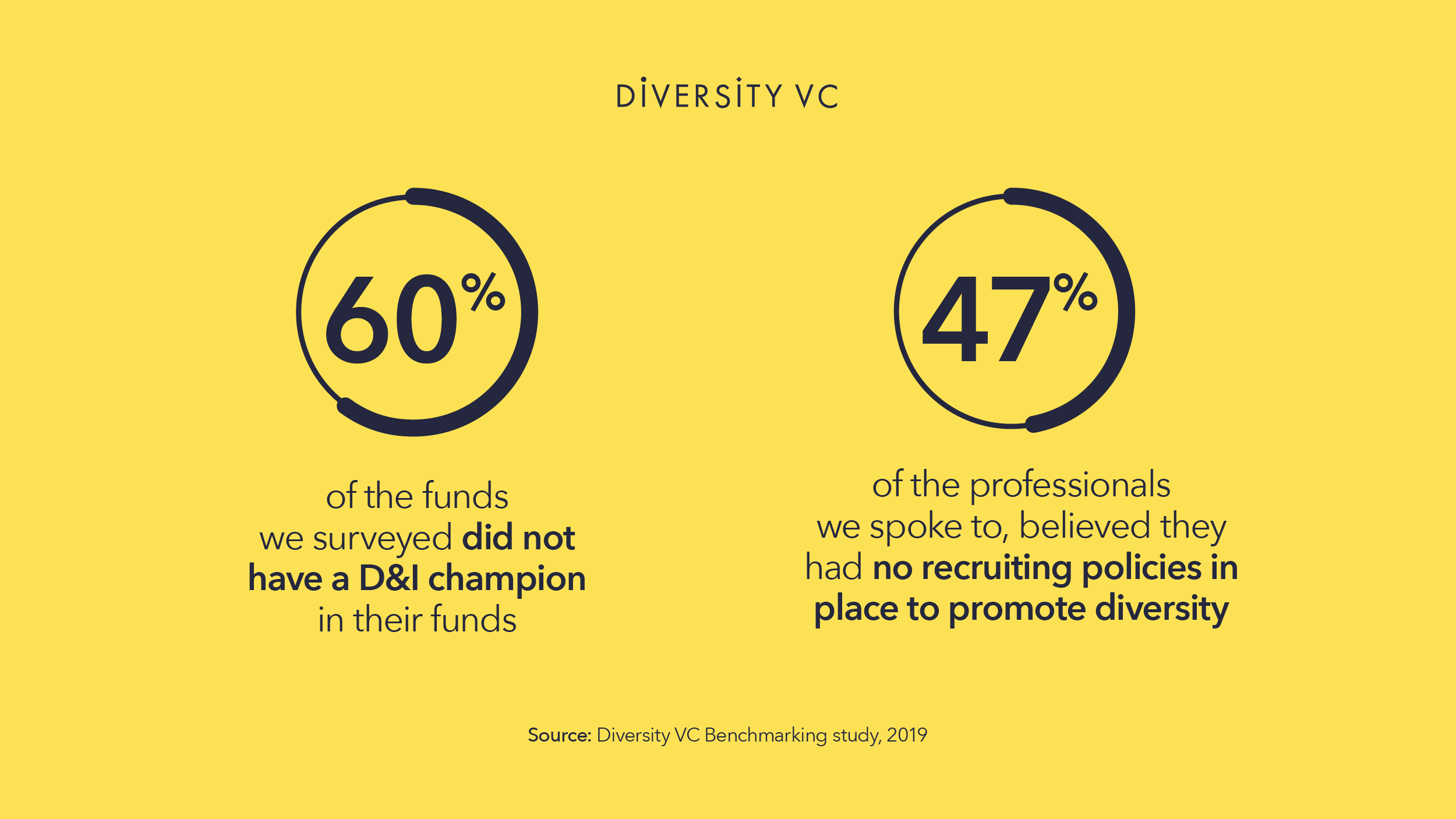Ada Ventures, a new $34m London-based venture capital fund investing in overlooked founders, has been a badly kept secret for a while now.
Today, it finally launches — 17 months after founders Check Warner and Matt Penneycard began raising. In that time they’ve met or contacted 330 limited partners (LPs), tweaked the pitch deck 114 times, received 125 ‘no’s, taken 62 flights and made 10 investments.
“It’s a massive relief,” says Warner, who is also cofounder of non-profit organisation Diversity VC. “Anyone you talk to will tell you how tough it is [to raise a fund]. You’re trying to get people to invest in something very long-term, with risks associated and, with our angle, in something very different to everything else you’ve invested in. That’s a lot to do.”
LPs in the fund include the British Business Bank, venture capital fund Atomico, prominent angel investor and cofounder of Transferwise Taavet Hinrikus, and diversity advocate and US-based venture capitalist Arlan Hamilton.
Change is coming
Ada Ventures is one of a small but growing group of funds in Europe focusing on underrepresented founders. It joins female-focused venture capital funds Borski Fund (based in the Netherlands), We Are Jane (based in Belgium), Voulez Capital and Silvergate Investments (based in the UK) and Jane VC (focusing on Europe and the US) among others, and minorities-focused venture capital funds like Impact X (based in the UK).
More specifically, Ada is looking for UK founders who are building businesses for underserved customer groups: women, parents, LGBT people and the ageing population, for example. It plans to lead pre-seed rounds with cheques of around £500,000.
“The over 65 category is the fastest growing of any in the world, yet so little money has been invested in good solutions for that population,” says Warner. Products and services for women have also been in short supply for a long time but that’s finally changing. “Femtech has become a category in its own right recently,” she adds. Several of Ada’s investments so far, including female sexual self-care startup Ferly and female sexual health company Juno Bio, fall into this category.
It’s not fair that these customer groups have been overlooked for so long — but that wasn’t a message that the people Warner and Penneycard were trying to raise money from responded to. “That seemed to resonate less well than when we talked about missed opportunities,” says Warner.
“Venture is all about outliers, looking where other people aren’t looking, finding something at a lower value than the market prices it at. All of our investors want to make money: we put it into their language, and that unlocked people’s enthusiasm.”
“Quoting statistics about unfair the situation is didn’t have the same impact,” she adds.
Investing in investors
The first investor Ada got onboard was pan-European venture capital fund Atomico. “They got onboard with this really early on — and also said they would introduce us to at least 10 of their LPs; that was the most powerful thing,” says Warner.
“That’s the story of the fund, to some extent: the ecosystem coming together to try to make something happen that wouldn’t have happened on its own.”
Ada’s biggest investor, the British Business Bank (which has contributed two-thirds of the fund) committed in July.
But it was far from smooth sailing. In-between receiving those commitments Warner and Penneycard received a whole load of knockbacks from LPs.
“Lots of people don’t want to be contacted by a new fund manager,” says Warner, who previously worked as an investor at Downing Ventures alongside Penneycard, but has never raised a fund before.
“We were told: ‘We only invest in teams who’ve been working together for 20 years or more’, ‘We only invest in fund two or three’, ‘Europe doesn’t have a diversity problem.’”
And from one LP: “‘Can women make money?’”
Wealth creation
This $34m is the first close of the fund; Ada hopes to raise another tranche of funding (up to $40m) in 2020. An even more diverse set of LPs would be welcome, says Warner: “It’s super important to make sure the people getting richer aren’t just the same people getting rich.”
“But saying that, it’s really difficult: I doff my hat to anyone who has done that. It’s difficult enough to raise, let alone optimise on ethnic and gender diversity,” she adds.
Ada has another strategy to spread the financial upside of investing, however: its scout network.
Over the past year, Ada has grown a team of 45 scouts from grassroots communities in the UK, including Yena, a network of entrepreneurs based in Bristol, and Muslamic Makers, a community for Muslims in tech. It’s not the only VC to adopt this strategy: London-based fund Backed VC has also built a team of scouts.
“We wanted to create something that would be an on-ramp for future angel investors and VCs,” says Warner, who hopes that people in this network might be encouraged to launch their own funds one day. “The angel community in the UK is 91% male, 93% white and the average age is 52. People around the table at the earliest stage of a company’s life are hugely impactful: if that’s our angel community they’re not going to make the change.”
In practice, scouts connect Ada with promising companies they meet through work or communities they belong to. In return they’re offered a “meaningful” cash finder’s fee (which can be invested into the startup) and an incentive linked to carried interest on that investment.
Warner thinks that’s a fair deal: “The last thing we’d want to achieve is for this to lead to more inequality,” she says. “There’s an authentic link between what people running those communities want and what we’re getting out of it. We’re investing in overlooked founders and markets, and provide meaningful feedback on every company, so there’s no misalignment there. And we’re talking to people all the time to make sure they feel like they’re getting a fair deal.”
Around 20% of Ada’s deal flow is currently coming from scouts and two of its investments so far have been sourced this way. One is unannounced; the other, Polipop, a startup with a patent on environmentally-friendly flushable sanitary pads, was discovered by a scout while on an accelerator programme in Exeter. “It’s a particularly relevant product for emerging markets,” says Warner.
Ada will continue bringing more scouts into its network over time. Warner says the network needs more people involved in communities around disability, LGBT, parents and entrepreneurs over 50.
Assessing founders differently
It’s not just how Ada sources companies which is somewhat different from the status quo: Warner and Penneycard have also redesigned how they assess startups — or rather, founders.
Ada looks for five characteristics, assesses these using structured interview questions, checks them through referencing, and then comes up with a score. Leadership is a good example of a characteristic she’s looking for.
Warner hopes this is more objective than the alternatives: “Where they went to school or university or which companies they’ve worked for, or saying, ‘He seems like a great guy, she seems backable.’”
Over time Ada hopes to create a “benchmark for what really excellent looks like” with these scores. “The intention is to become more data-driven and objective about how to decide to back companies,” says Warner.
Warner also wants to treat the founders who pitch to Ada better than some of the LPs she pitched to: “By being responsive, by saying no, by giving good reasons for saying no.”
“The level of financial pain and strain we’ve been through gives us both a different sense of empathy,” she says. “And that’s from people from ultimately fairly privileged backgrounds. We had a financial safety net. It gives us a deeper understanding of the barriers to being a founder.”
Setting an example
Warner and Penneycard now have a lot to live up to, more money to raise, 10 portfolio companies to manage and around 20 more startups to scout out and invest in.
“I would like to prove that this strategy can deliver best-in-class venture returns,” says Warner. “There’s no reason at all why it can’t.”
“There’s so little innovation in VC; I hope that this can show that if you do challenge a few stereotypes, do things a bit differently, you can be rewarded with amazing returns. That’s ultimately the only thing that make a difference.”


